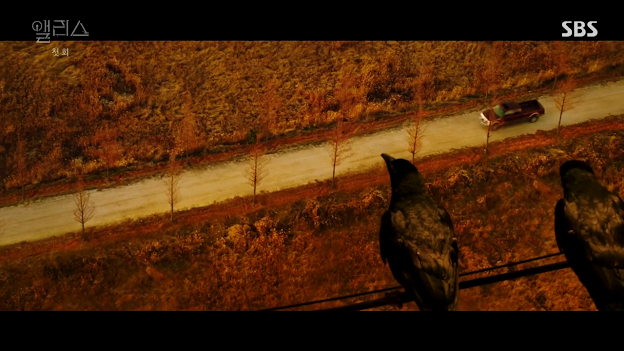Time travel is notoriously hard to get right and to present in a form without many plot holes and inconsistencies. There is not even one work of fiction that gets it right, and the one that was closest to it was SyFy series 12 Monkeys. And only because they invented their own mythology of time.
In his book Brian Clegg (1) explains the physics behind the time travel. I think I quoted this book in numerous posts here (example) but it's a really light reading on a fairly complicated issue. There is not a one law in Physics that explicitly forbids the time travel. However, it seriously limits the possibilities.
We have two timelines here, one in the future and one in the past. And one common denominator - Alice in Wonderland. I'm not joking, the references to that book are everywhere. Even in the name. We know that in the future, some people who have money can come to the agency and travel back in time for a moment, but they always have to return.The first breach (that we know of) is done by a mother trying to change her daughter's path so that she wouldn't end up dead. But as Clegg said, time will always find a way to correct itself - her daughter nearly died from a disease her future mother brought with her. If this were a smallpox - it was a clear ad in favor of vaccinations.
But in her growing delusion and desperation - the woman kills herself from the past, ruining the family and making her daughter an orphan and her husband a widower. Now, a person from the future should not interact with their past selves because the effects could be devastating. It was shown very well in 12 Monkeys and I had hoped Alice could address it as well, but so far, nothing of the kind. The woman just strangled her past self. The effects were different than just pure law of Physics being broken, namely Pauli's exclusion principle.
We know Jin-gyeom can hop through timelines, but the question remains - does his movement create the different timeline? And how that card that allows it actually work? Because - again borrowing from Clegg's theories - the time machine cannot move us further in time than the point of its invention. Rendering it all moot in effect. The end of ep. 4 (the preview of ep 5) shows that Jin-gyeom called his mother in 2010, the year she was killed. And this is coming dangerously close to the Grandpa paradox, and also may change the future. Or maybe not, because the time corrects itself. Inventing time machine to travel back and kill Hitler doesn't necessarily mean the atrocities of WW2 would not have happened (2). Also, Jin-gyeom's inquiries whether Tae-i knows him. No, she doesn't. This woman in 2020 didn't give birth to you.
 |
| Jurassic Park's Jeff Goldblum is shedding a solitary tear now. |
We have people who think the time travel should not have been invented at all, so on one hand - we have the time travelers, and on the other - people who would want to dismantle it. In some prophesy/chosen one sauce. It makes for a good drama, I'll give them that, but puts the world-building and technological narrative on the altar of emotional plot.
So for now, I am a little underwhelmed by the 4 episodes. I am optimistic though.
1. B. Clegg, How to Build a Time Machine: The Real Science of Time Travel, 2011
2. I've always had problems with this Eurocentric narrative. Kill Hitler and WW2 never happens. People forget that the war was brewing for decades just fine without him in East Asia. In fact, Japan's aggression started the war and Hitler was an assurance card for the Imperial Army. So no, the war would still happen.








